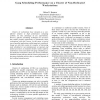Free Online Productivity Tools
i2Speak
i2Symbol
i2OCR
iTex2Img
iWeb2Print
iWeb2Shot
i2Type
iPdf2Split
iPdf2Merge
i2Bopomofo
i2Arabic
i2Style
i2Image
i2PDF
iLatex2Rtf
Sci2ools
135
click to vote
ANSS
2002
IEEE
2002
IEEE
Gang Scheduling Performance on a Cluster of Non-Dedicated Workstations
Clusters of workstations have emerged as a costeffective solution to high performance computing problem. To take advantage of any opportunities, however, effective scheduling techniques are necessary that enable parallel applications to dynamically share workstations with their owners. In this paper a special type of parallel applications called gangs are considered. Gangs are jobs that consist of a number of interacting tasks scheduled to run simultaneously on separate and distinct processors. A simulation model is used to address performance issues associated with gang scheduling on a non-dedicated workstation cluster for various workloads. Simulated results indicate that the relative performance of the gang scheduling policies that we examine depends on the workload characteristics.
Related Content
| Added | 14 Jul 2010 |
| Updated | 14 Jul 2010 |
| Type | Conference |
| Year | 2002 |
| Where | ANSS |
| Authors | Helen D. Karatza |
Comments (0)

